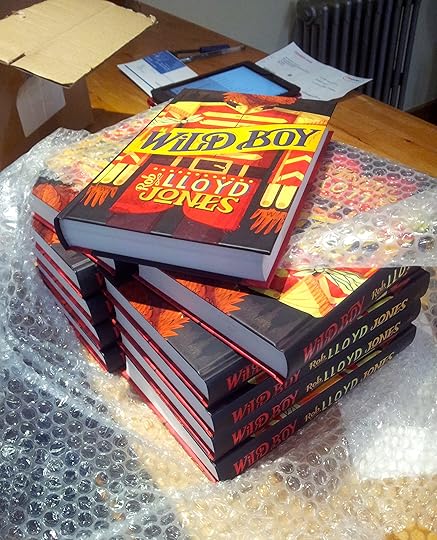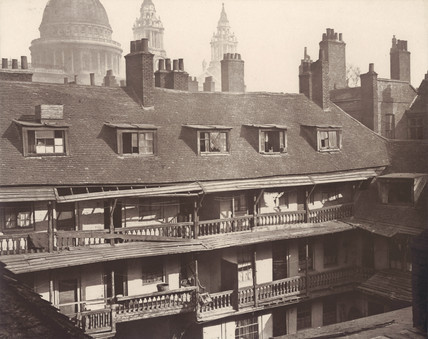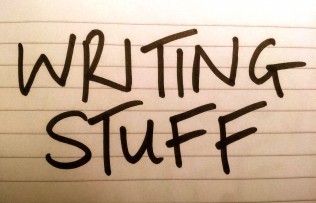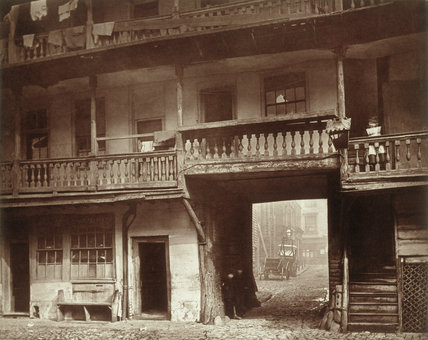Rob Lloyd Jones's Blog, page 2
March 20, 2013
A box of Wild Boy joy


Opening it was, I think, the first time I realised I had actually written a book. I had seen a copy before, but on it's own it seemed like a bit of a trick - a one-off thing that only I would ever own. But a boxful of the things feels much more real. It exists. There is no stopping it. Well, an axe could stop it, wielded with enough force. And a paper shredder could too, if you had the patience to feed them page by page into the machine. Or a house fire, easily. Okay, there's lots of ways to stop it. But for now it exists!
March 18, 2013
London lost and found

I’ve been working on the sequel to Wild Boy – Wild Boy and the Black Terror. While the first book is set among London’s underworld - the rough fairgrounds, foul sewers and crumbling slums - the action of book 2 takes place where the rich folk lurk: the royal palaces, opera theatres and posh townhouses. One important scene, though, leads the detective and acrobat back to the slums and, specifically, to a place I’ve loved for years, even though I’ve only ever seen it in photographs.
It’s the Oxford Arms, a coaching inn that stood the shadow of St Paul’s Cathedral, on Warwick Lane. Until its demolition in 1877, the Oxford Arms was one of London’s last 17th century galleried inns. Apparently it survived the Great Fire in 1666, but I’m not sure how; I’ve rarely seen a more flammable-looking place. These photographs were taken by Henry Dixon months before the inn was demolished, and are linked to a gallery at the Museum of London where you can see more of Dixon's work.
Coaching inns were like our motels, where wagoners and stage-coachmen could stable their animals, rent rooms, and refresh themselves at the bar. Actors set up little stages in the yard, and passed around a top hats as they performed for weary travellers watching from the galleries.
Towards the end of the century, though, trains had replaced coaches for long distance trips. Hotels were built near railway stations, and the need for coaching inns was lost. Many were destroyed, but somehow the Oxford Arms survived. At least, just about survived. It is wonderfully derelict. Those decrepit doorways, windows without glass, roofs without tiles. The place makes me think of a witch’s grin – all crooked teeth and rotten gums. I’ve rarely felt such an urge to explore a building, or such frustration that I can't.
Records say that the Oxford Arms was abandoned when these photos were taken, but the images clearly show otherwise; that hanging washing and those ghostly figures staring from doorways.
An optimistic estate agent might have described the place as a fixer-upper, but it clearly needed more than a lick of paint. It needed to come down. Yet it’s demolition caused an outcry. Around that time, a lot of London’s historic buildings had been destroyed to make way for new streets or railway lines. City planners looked to sweep away relics of the medieval city and raise monuments to the modern age.
I’m all for that. Cities should change. They have to change. But we can’t just erase the past. That’s why I love the Oxford Arms. You see, the scheduled demolition of this diapidated inn led directly to the formation the Society for Photographing Relics of Old London (one of the most practical Victorian names I’ve come across) who commissioned these photographs, and others, to record the city that was vanishing around them. I like to think that, by taking Wild Boy and Clarissa there too, I’ve added a few lines of my own to this document of lost London.
March 14, 2013
Live like Huck

Not really a blog - just sharing something. I just finished Huckleberry Finn. What a book! I ranted to a friend that I wanted my own son to have a Huck Finn childhood, but realised afterwards that would mean I beat him and he runs away from home and becomes a thief. What I meant, though, is encapsulated in the following passage, as Huck tells us about how he joined Tom Sawyer's gang. I don't think I've ever loved a piece of writing as much as the one below. It is everything that's wonderful about childhood.
"Now, we'll start this band of robbers and call it Tom Sawyer's Gang. Everybody that wants to join has got to take an oath, and write his name in blood."
Everybody was willing. So Tom got out a sheet of paper that he had wrote the oath on, and read it. It swore every boy to stick to the band, and never tell any of the secrets; and if anybody done anything to any boy in the band, whichever boy was ordered to kill that person and his family must do it, and he mustn't eat and he mustn't sleep till he had killed them and hacked a cross in their breasts, which was the sign of the band. And nobody that didn't belong to the band could use that mark, and if he did he must be sued; and if he done it again he must be killed. And if anybody that belonged to the band told the secrets, he must have his throat cut, and then have his carcass burnt up and the ashes scattered all around, and his name blotted off of the list with blood and never mentioned again by the gang, but have a curse put on it and be forgot forever.
Everybody said it was a real beautiful oath, and asked Tom if he got it out of his own head. He said, some of it, but the rest was out of pirate-books and robber-books, and every gang that was high-toned had it.
Some thought it would be good to kill the families of boys that told the secrets. Tom said it was a good idea, so he took a pencil and wrote it in. Then Ben Rogers says:
"Here's Huck Finn, he hain't got no family; what you going to do 'bout him?"
"Well, hain't he got a father?" says Tom Sawyer.
"Yes, he's got a father, but you can't never find him these days. He used to lay drunk with the hogs in the tanyard, but he hain't been seen in these parts for a year or more."
They talked it over, and they was going to rule me out, because they said every boy must have a family or somebody to kill, or else it wouldn't be fair and square for the others. Well, nobody could think of anything to do—everybody was stumped, and set still. I was most ready to cry; but all at once I thought of a way, and so I offered them Miss Watson—they could kill her. Everybody said:
"Oh, she'll do. That's all right. Huck can come in."
March 7, 2013
I heart the Royal Festival Hall

My weeks go like this: three days at my job, three days writing at home, and a weekend day slobbing about. It varies, of course, but that’s roughly the deal. Only, I have problems working at home. I waste a lot of time doing nothing in particular. So at least once a week I head to the Royal Festival Hall on London’s Southbank.
I love the RFH.
The building is huge and cavernous, yet somehow feels small and cozy. They serve coffee that could wake the dead, and the staff are mostly nice. You’ll find stuff going on everywhere among its Escher-like warren of staircases, dead-ends and overhanging balconies. Turn one corner and you find musicians doing something horrible with steel drums. Rush up a flight of stairs and there’s Goldie talking to an audience about his life. Turn again and stumble into a photography exhibition, a jazz recital, a book club...
That was all just last week.
The range of events, most of which are free, is dizzying and downright odd. Earlier this year, they spent a month building a maze from 250,000 books. It was up for a few days and then they got rid if it. It looked like this and it was a thing of joy.
Around the same time, they also built a massive Lego map of the world. It had little Lego mountains with Lego snow at their peaks. Another time I went into the basement and I saw this:
I’m not sure if it was an art thing, or if I’d unknowingly descended to the staff laundry.
All life is there, or at least all London life. Homeless people shelter in alcoves beside designers staring at Macbooks. Groups of night workers huddle around radio campfires. Because it’s free and has lots of desks, suited people call it their office. You hear them on the phone telling people ‘I’m at the office’. They actually say that.
It’s a brilliant place for people-watching, but even better for eavesdropping. BBC writers talk loudly about their scripts. English language tutors talk even louder, but much slower, to terrified pupils. I once earwigged on a well-known documentary maker interviewing someone about human trafficking. He assured his source that it was all highly confidential. Was he joking? Everyone could hear, and we were hanging off each word.
I've not even touched on the range of concerts performed in the concert hall. Some of them seem a bit posh, but they're often really affordable so they don't have to be. And, before each performance, announcements are made by recordings of Ian McKellan's voice. So you hear Gandalf telling you the lifts don't work, which is pretty cool.
Anyhow, it’s a wonderful place and you should check it out if you’re in London.
I’m there now, as it happens, writing this.
February 26, 2013
This blog is a waste of time

Don’t get me wrong, I really like writing too. It’s just that, too often, something stops me. This morning I spent thirty minutes debobbling an old jumper as I watched Top Gear on Dave (I dislike that jumper, I hate Top Gear, and I despise Dave). Yesterday I sharpened all the knives in the kitchen and then ordered a new sharpener, which had to be researched on-line and in-depth (I chose AnySharp’s Global World's Best Knife Sharpener, in cobalt blue. It’s okay.)
The whole time I knew I should be writing.
So when the nice people at Walker Books suggested I write a blog, I groaned. More work, right? But they said NO! Write rubbish, they said, write whatever you want. And that sounds like a brilliant waste of time.
So, to start, here my top five ways of wasting time:
Research:
My first novel is set in 19th century London. For research, I went into London a lot. Shopping and stuff.
Right Move:
I am not moving house. I have no plans to move house. Yet I spend at least half an hour a day on this property site, inspecting houses that I could never afford.
Peanut butter:
Two important things: the jar must remain within a metre of its cupboard, and its contents can only be consumed with a spoon. So you eat a spoonful, then sit down to work, then get up for another spoonful. Repeat until empty and then go buy another jar.
Staring through windows:
A classic, but often taken for granted. I sometimes work at the Royal Festival Hall, on London’s Southbank. It has the biggest window in the world, with views up and down the Thames. I can, literally, spend a whole day staring out of it hoping to spot a corpse float past.
Exercise:
Not technically a waste of time because it’s good for you, but my motive is work-dodging rather than death-avoidance. Set an exercise bike in front of the TV, and an hour flies by.
Right, got to go. These forks won’t sharpen themselves you know.
Rob Lloyd Jones's Blog
- Rob Lloyd Jones's profile
- 65 followers





